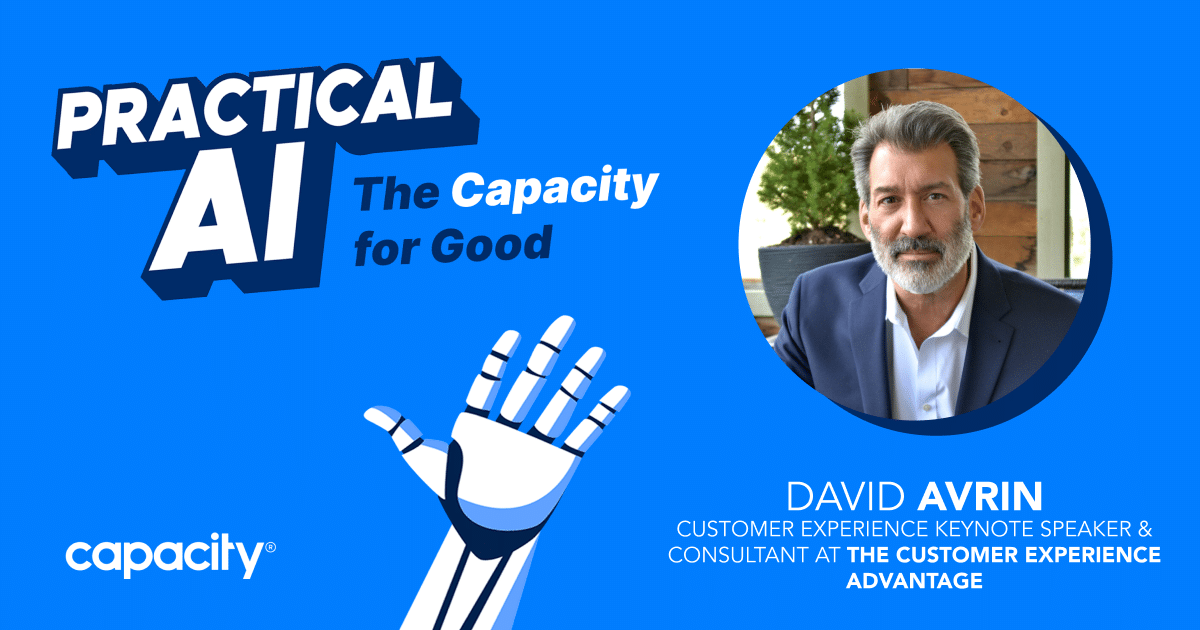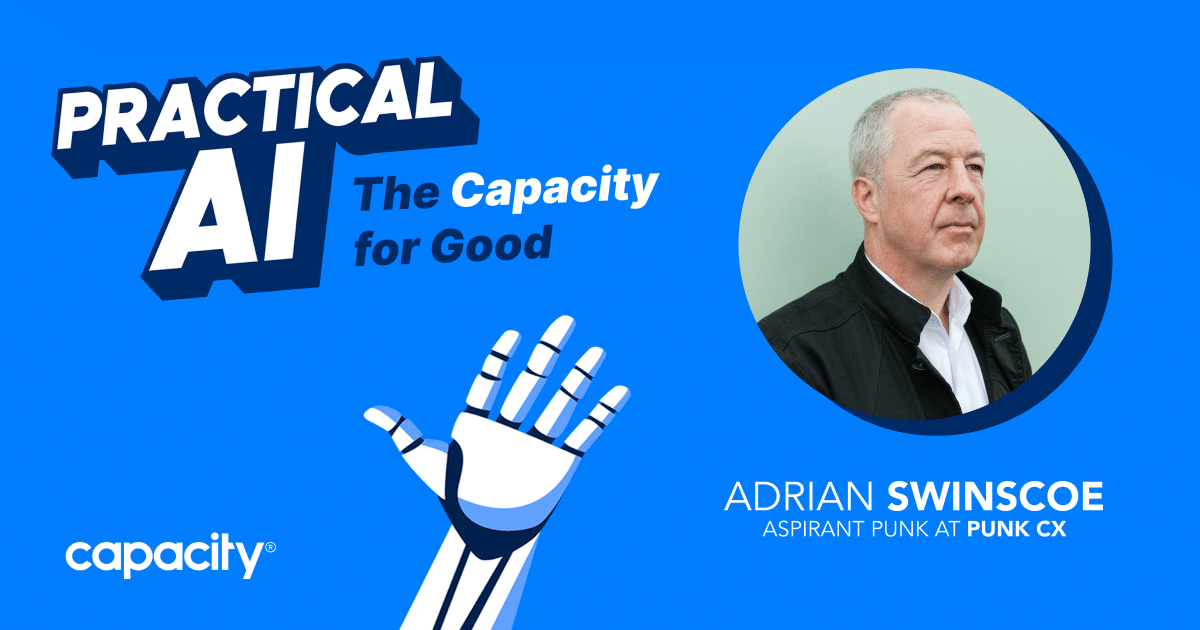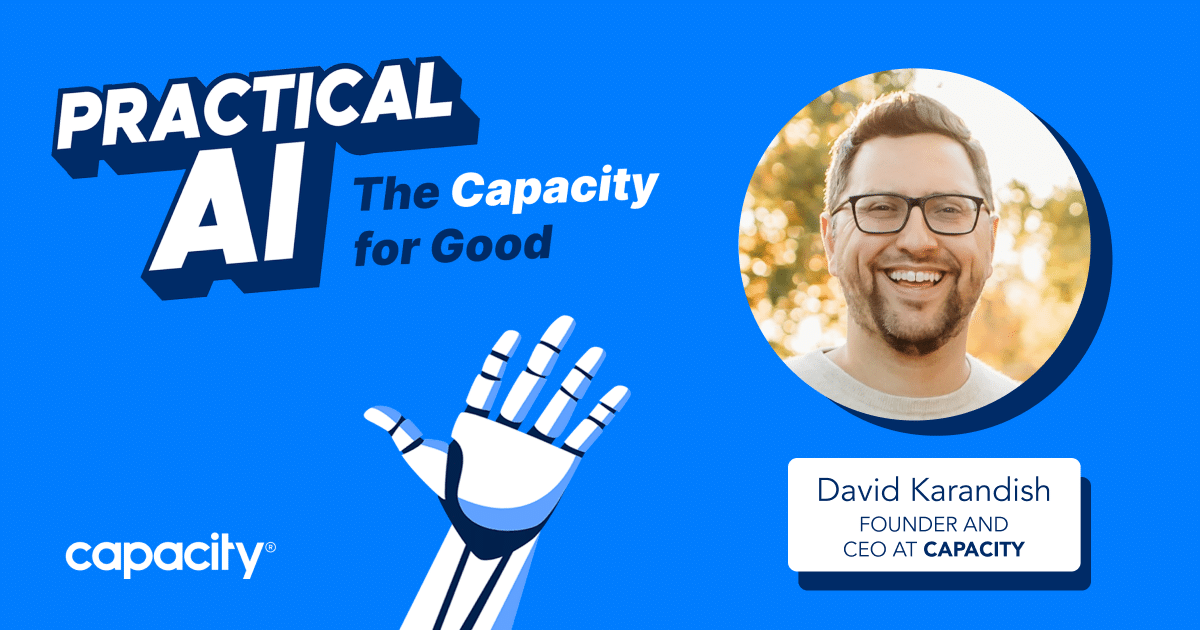As we navigate through the Jetsons age of connectivity, how is your company adapting? While you’ve already undergone the first steps of your digital business transformation strategy, how are you maturing it? What’s are your next steps forward? How does automation play in your strategy? And what are the ethical implications of your transformation?
According to the World Economic Forum, digital transformation is expected to add $100 trillion to the world economy by 2025. What’s more, by 2025, interactions driven by platforms are expected to enable roughly two-thirds of the $100 trillion value at stake from digitalization.
It’s time to mature your digital business transformation strategy and reshape how to stay competitive as an employer and a service or product provider.

Automate Your Work
Capacity’s enterprise AI chatbot can help:
- Answer FAQs anytime, anywhere
- Find relevant documents within seconds
- Give surveys and collect feedback
While the benefits of a digital transformation strategy are hefty, they don’t come without some challenge. Among these, the ethical considerations associated with implementing automation and AI stand out as particularly significant. As you rely on technology, you’re tasked with navigating complex privacy, data security, job displacement, and the like.
It’s vital for you to recognize and address these ethical considerations as you embark on your digital business transformation journey. By doing so, you can ensure your approach to transformation is strategically effective and ethically sound.
Understanding the ethical considerations in automation and AI

Fairness and bias
Fairness and bias are central ethical considerations in automation and AI for a significant reason. AI systems are often trained on large data sets, reflecting real-world scenarios and decisions. If these data sets contain biases—whether related to race, gender, age, income level, or other factors—AI systems can unintentionally perpetuate or even amplify these biases. For instance, a hiring algorithm trained on historically biased data might unfairly disqualify specific candidates. Or AI used in lending could disproportionately deny loans to people from particular demographics.
As such, it’s vital to ensure fairness in AI systems to avoid perpetuating societal biases and causing harm or disadvantage to certain groups. Fairness in this context doesn’t only mean treating everyone the same. Instead, it calls for recognizing and accounting for inequalities in data and ensuring that AI systems don’t unintentionally favor one group over another. It’s about making sure the benefits of AI and automation are accessible to all, not just a select few. Failure to address this aspect of AI ethics can lead to reputational damage and even legal consequences.
Privacy and data protection
AI systems often rely on vast amounts of data to function effectively. This data can include sensitive information about individuals, such as financial transactions, health records, browsing habits, or personal communications. The widespread collection and use of such data raise critical concerns about privacy and data protection, which are crucial ethical considerations in any digital business transformation strategy.
Privacy is a fundamental human right, and any violation can lead to significant harm, from identity theft to undue influence and manipulation. Data protection, conversely, is about securing data against unauthorized access or breaches that could expose private information. Given that AI and automation systems can process data at unprecedented scales and speeds, they amplify the potential risks and impacts of privacy violations or data breaches. Furthermore, the use of AI in areas like profiling and predictive analytics can lead to intrusive surveillance or discrimination if not carefully managed. Therefore, your business must implement robust measures to respect privacy rights and protect data to maintain trust and comply with increasingly stringent regulations worldwide.
Job displacement and workforce impact
According to the World Economic Forum, digital transformation is expected to add $100 trillion to the world economy by 2025. What’s more, by 2025, interactions driven by platforms are expected to enable roughly two-thirds of the $100 trillion value at stake from digitalization. While these expectations favor the world economy, this doesn’t mean it won’t come without its pitfalls.
These technologies can enhance efficiency and productivity but also automate specific tasks currently performed by humans, leading to job displacement. Roles that involve repetitive tasks or data processing are particularly vulnerable. This displacement can profoundly impact the workforce, leading to job losses and a heightened need for re-skilling.
Beyond job displacement, automation, and AI can also alter the nature of remaining jobs, requiring workers to adapt to new working methods and potentially leading to workforce disruption. For instance, employees may need to learn new skills to work alongside AI systems or move into roles that involve managing or overseeing these technologies. This shift presents an ethical consideration as businesses are responsible for supporting their employees through these transitions, whether providing new training opportunities, ensuring fair treatment of displaced workers, or creating a positive work environment that embraces technological change. Managing this impact responsibly can lead to more sustainable digital business transformation.
Creating transparency and accountability
Algorithmic transparency
Transparency is key to building trust in AI systems. This involves clarifying how AI systems make decisions, also known as algorithmic transparency. While full transparency might not always be possible due to the complexity of some AI models, efforts should be made to explain the decision-making process in a way that is understandable to users and stakeholders.
Human oversight and responsibility
Despite the advancement of AI and automation, human oversight remains crucial. It’s essential that humans are still involved in overseeing AI systems and can intervene when necessary. Additionally, clear lines of responsibility should be established to ensure accountability when AI systems make mistakes or cause harm.
Creating ethical AI governance frameworks

Establish your ethical guidelines
Creating an ethical AI governance framework starts with establishing your ethical guidelines. These guidelines should reflect your organization’s values and provide clear direction on ethical issues related to AI and automation, such as fairness, privacy, and transparency.
Ethical review and impact assessments
Before implementing AI systems, conduct an ethical review and impact assessment. This can help you to identify potential ethical risks and ways to mitigate them. This should thoroughly examine the system’s purpose, the data it uses, how it makes decisions, and its potential impact on individuals and society.
Regular audits and compliance
Regular audits of AI systems can help ensure they continue operating ethically and in line with your guidelines. These audits can assess algorithmic bias, data privacy compliance, and transparency. In addition, having a strong compliance function can help ensure that your use of AI and automation adheres to all relevant laws and regulations.
Considering ethics in your digital business transformation strategy is not just about avoiding harm or legal issues. It’s also about building trust with customers, employees, and stakeholders. As you navigate your organization’s digital transformation journey, keeping these ethical considerations front and center can help ensure that your use of AI and automation aligns with your values and contributes positively to society.

Automate Your Work
Capacity’s enterprise AI chatbot can help:
- Answer FAQs anytime, anywhere
- Find relevant documents within seconds
- Give surveys and collect feedback





